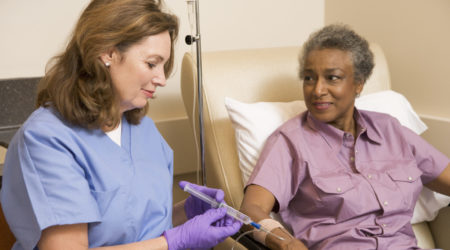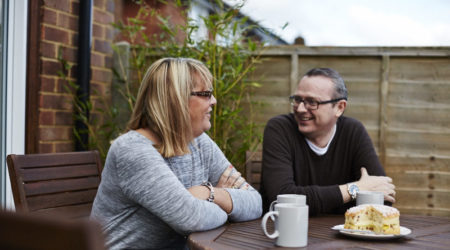



George
George, 72, was diagnosed with inoperable pancreatic cancer adenocarcinoma which had spread to the liver in April 2011.
I’ll never really know, but I guess my problems may have started in September 2010, when I consistently woke up in the middle of each night with a strange feeling in my abdomen which was not painful and which I could only describe to my GP as “butterflies”. We both agreed that it may have been due to stress (I had been organising my daughter’s wedding) and it would probably go away. But it didn’t! I subsequently asked my GP for something to help me sleep and, after she carefully examined my stomach, I was prescribed anti-depressants.
The feeling then changed to a mild cramp which only occurred when I was laying on my back and which disappeared when I turned onto my side. My GP indicated that this was almost certainly a muscular problem and nothing to worry about. But then the “cramp” occurred more regularly, whether I was lying, sitting or standing and it became quite painful. Another visit to my GP, another stomach-feeling session and she organised an ultrasound scan.
I had this in April, 2011 and then things happened quickly. The radiologist informed me that “something” was on my pancreas and also my liver and that she would contact my GP immediately recommending that I see a specialist urgently. At this point, my wife and I decided to see a specialist surgeon privately. This I did and he organised a CT scan which found a large tumour on my pancreas and several smaller ones on my liver. He indicated that these may not necessarily be malignant and that biopsies would be necessary.
At this point, I searched the internet and learned several unpleasant facts….pancreatic cancer is the most difficult to treat…..only one in four sufferers last 12 months, etc. So, I began to plan for the worst, but hoped for the best. I started to “get my house in order” so that my wife could deal with various matters such as internet banking, etc. after my death. I also made a point of not buying anything for myself, cancelling holidays and generally became very depressed and miserable.
A subsequent liver biopsy proved inconclusive (this raised our hopes) but then an endoscopy into my pancreas confirmed the malignancy and a laparoscopy confirmed that the tumours on my liver were also malignant. This apparently ruled out an operation to remove the pancreatic tumour.
The next step was chemotherapy and, not having private medical insurance, and knowing the likely cost of chemotherapy, we initially opted for NHS treatment and I had the usual preliminary visits to hospital to arrange this. However, I then heard about a paper in the “New England Journal” which discussed the effects of treatment of metastatic pancreatic cancer using a chemotherapy drug called FOLFIRINOX and which showed a fairly significant increase in life expectancy over GEMCITABINE and CISPLATIN which the local NHS were using. My initial reaction was that it was out of the question to fund this myself, since, although we have savings, a likely cost of £45,000 or so for an extra 6 months or so of life seemed very expensive (I am a Yorkshireman!).
My wife and daughters had other opinions however and they persuaded me to see an oncologist privately. He indicated that, although I was 71, I was quite fit and suggested that we go ahead and then review the situation after 4 treatments. So, very much against my best intentions I agreed (women can be very persuasive). Then, oh dear! The after effects of the first chemotherapy were not good! I went through a 48 hour period of constant vomiting. I felt terrible and the fact that I was actually paying for this pain made it worse. I just wanted to die and decided that enough was enough, so no more chemotherapy. I cancelled the second session and instead had a discussion with the oncologist. He suggested that he reduce the drug to 80% of its normal dose and asked me to consider this. Again, much pressure from my wife and daughters and I agreed.
I completed my course of 12 chemotherapy sessions in mid-February, 2012 and felt much better. The first 8 days after each session were rough (any physical effort, e.g. showering, made me very tired, I felt sick, but didn’t vomit thank goodness and my fingers and feet were very sensitive to cold) but, apart from still tiring easily I felt quite well. No vomiting and very little pain. At the same time, the CA19.9 cell marker had dropped from a peak of 33000 to around 120 and I’d also replaced most of the two stones in weight that I originally lost.
My attitude to life also changed in that I did enjoy myself, I did spend money on myself and we planned holidays. My state of mind had obviously become more positive and I’m told that my sense of humour had returned.
On the downside I suffered a DVT in January (quite common with pancreatic cancer I’m told) so my wife is now enjoying giving me a daily injection of enoxaparin. I also have to wear thigh length compression stockings and, horror of horrors, I have to wear a suspender belt!! Oh, and did I mention that I developed diabetes shortly after the cancer was diagnosed? Again I’m told that this is a common side effect. I’m now injecting insulin twice a day.
Unfortunately, the abdomen and back pain returned in April 2012 and at the same time, the CA19.9 marker started to increase at quite a high rate. My oncologist recommended more chemotherapy and I started this a week ago so I’m now feeling really rough. I have the usual chemo sickness feeling and I’m also experiencing diarrhoea. I’m just not sure what will happen now but I’m told I’m still being positive. I know the tumours will eventually kill me but if only one in four sufferers last for a year, then I intend to be that one!
April 2012




